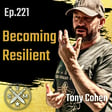
EP173: Marty Strong - F*ck It! And Why It Matters
“F*ck it. It’s kind of an internal cue for me to shut all those voices down, take a deep breath, and just start figuring out and planning and doing what I have to do to succeed.”
Let’s get real: most men today are operating at about 30% of their potential, and that’s being generous. Emotional sovereignty—the ability to own your inner chaos and come out on top—isn’t just a luxury; it’s survival in a world that rewards mediocrity. This episode is the antidote for men who are tired of feeling like they’re living life with the training wheels still on.
Our guest today, Marty Strong, doesn’t just talk the talk—he’s walked it, ran it, and probably swam it under enemy fire. With 20 years in the Navy SEALs, Marty’s resume includes leading 36 combat missions, going from enlisted SEAL to officer, and then flipping the script into finance, counterterrorism, and corporate leadership. Oh, and he also writes books. Because, of course, he does.
Marty peels back the layers of what it takes to go from “meh” to mentally unbreakable. Hint: it’s not about looking tough; it’s about training your brain to tell your inner quitter to shut up and sit down. From cold water hell weeks to crushing corporate chaos, Marty lays out how SEAL-level grit translates to everyday life.
Whether you’re out to crush it in business, relationships, or just trying to survive a leg day, this episode will make you laugh, think, and maybe even cancel your Netflix binge for a real workout. Spoiler: emotional sovereignty is the ultimate flex.
• “Be Nimble: How the Creative Navy SEAL Mindset Wins on the Battlefield and in Business”
• Amazon: https://www.amazon.com/Be-Nimble-Creative-Battlefield-Business/dp/1789048400
• “Be Visionary: Strategic Leadership in the Age of Optimization”
• Amazon: https://www.amazon.com/stores/author/B09DRR9F5L/about
• “Be Different: How Navy SEALs and Entrepreneurs Bend, Break, or Ignore the Rules to Get Results!”
• Amazon: https://www.amazon.com/Be-Different-Entrepreneurs-Ignore-Results/dp/1803411333
You’re invited to come to a Sovereign Circle meeting to experience it for yourself. To learn more, go to https://www.sovereignman.ca/. While you’re there, check out the Battle Ready program and check out the store for Sovereign Man t-shirts, hats, and books.



















